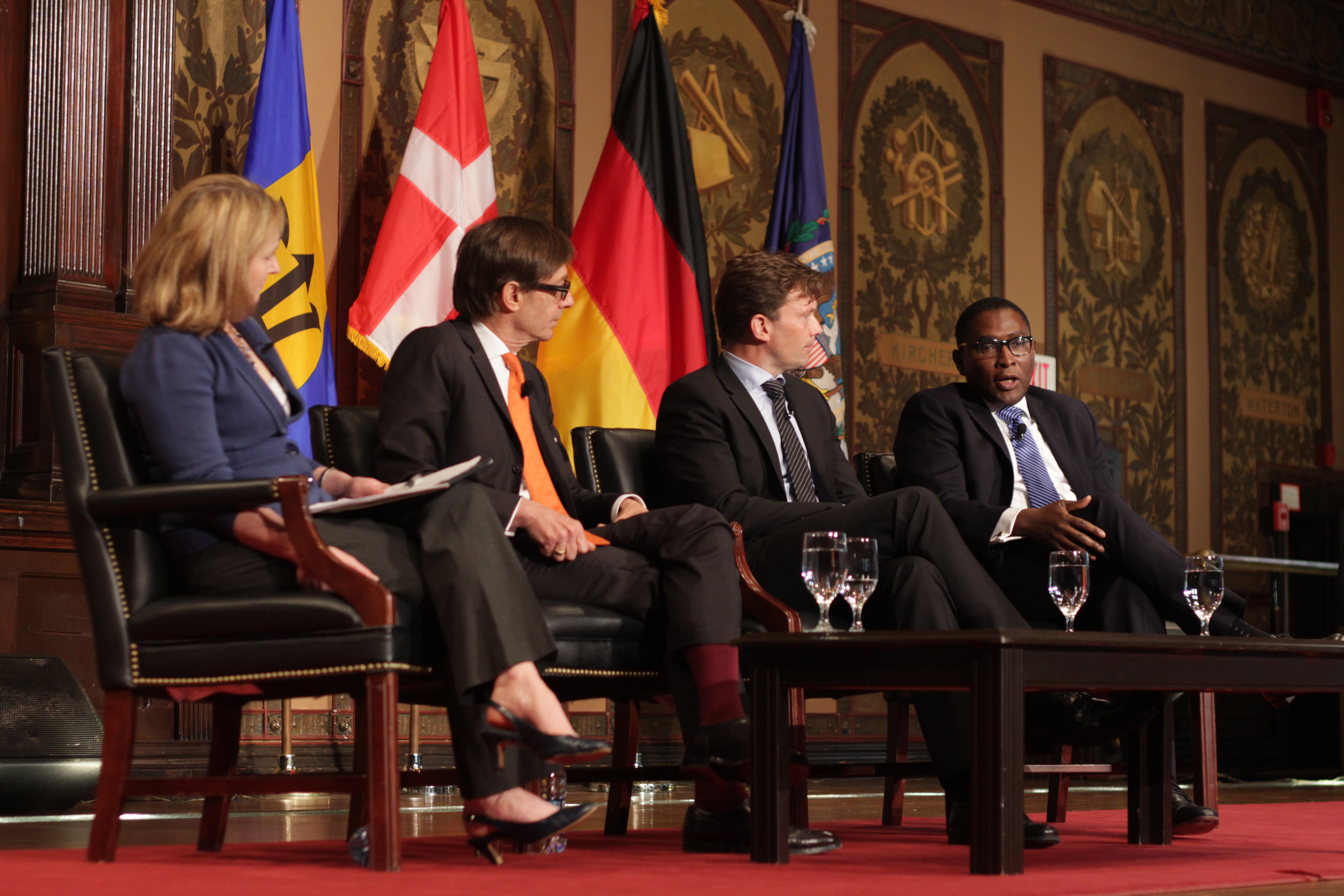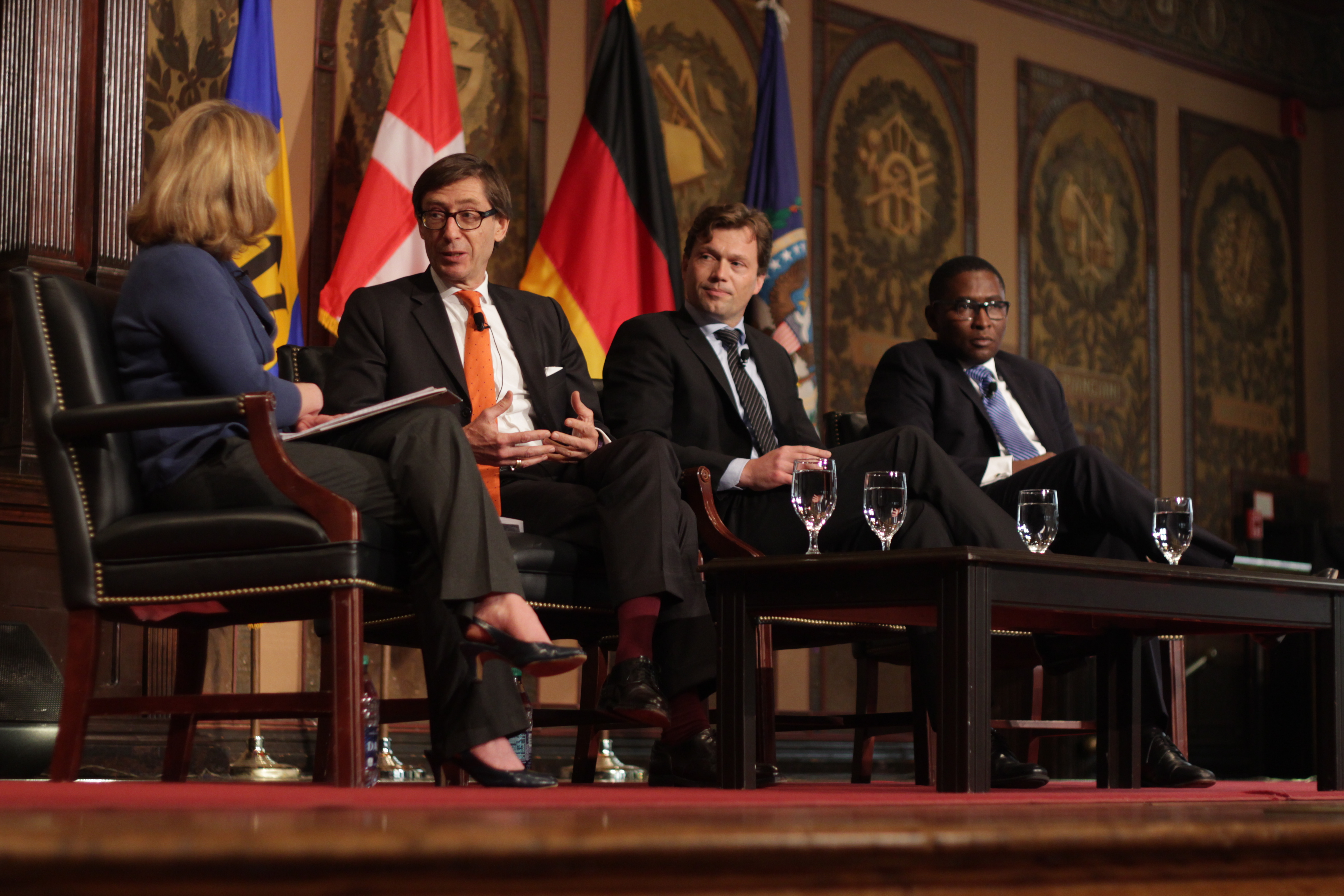
On Wednesday, April 5, 2017, the Georgetown Caravel Initiative for Diplomatic Engagement hosted the “Ambassadors’ Summit: Climate and Conflict” in Gaston Hall. This event, part of the SFS Centennial Event Series, convened distinguished guests to discuss issues at the intersection of climate change, the environment, and international security.

SFS Dean Joel Hellman welcomed guests and introduced the event. Hellman described the discussion in the context of conflict, poverty reduction, and human development. “The topic today, the effort to try to understand how climate impacts conflict and vice versa is really an essential foundation for understanding poverty reduction as we move forward,” Hellman said.
Security Calculus Now Includes Environmental Security
General James L. Jones, USMC ret. (SFS’66), who served as National Security Advisor to President Obama from 2009-2010 and previously as Supreme Allied Commander in Europe and Commandant of the U.S. Marine Corps, presented a keynote address to open the summit.
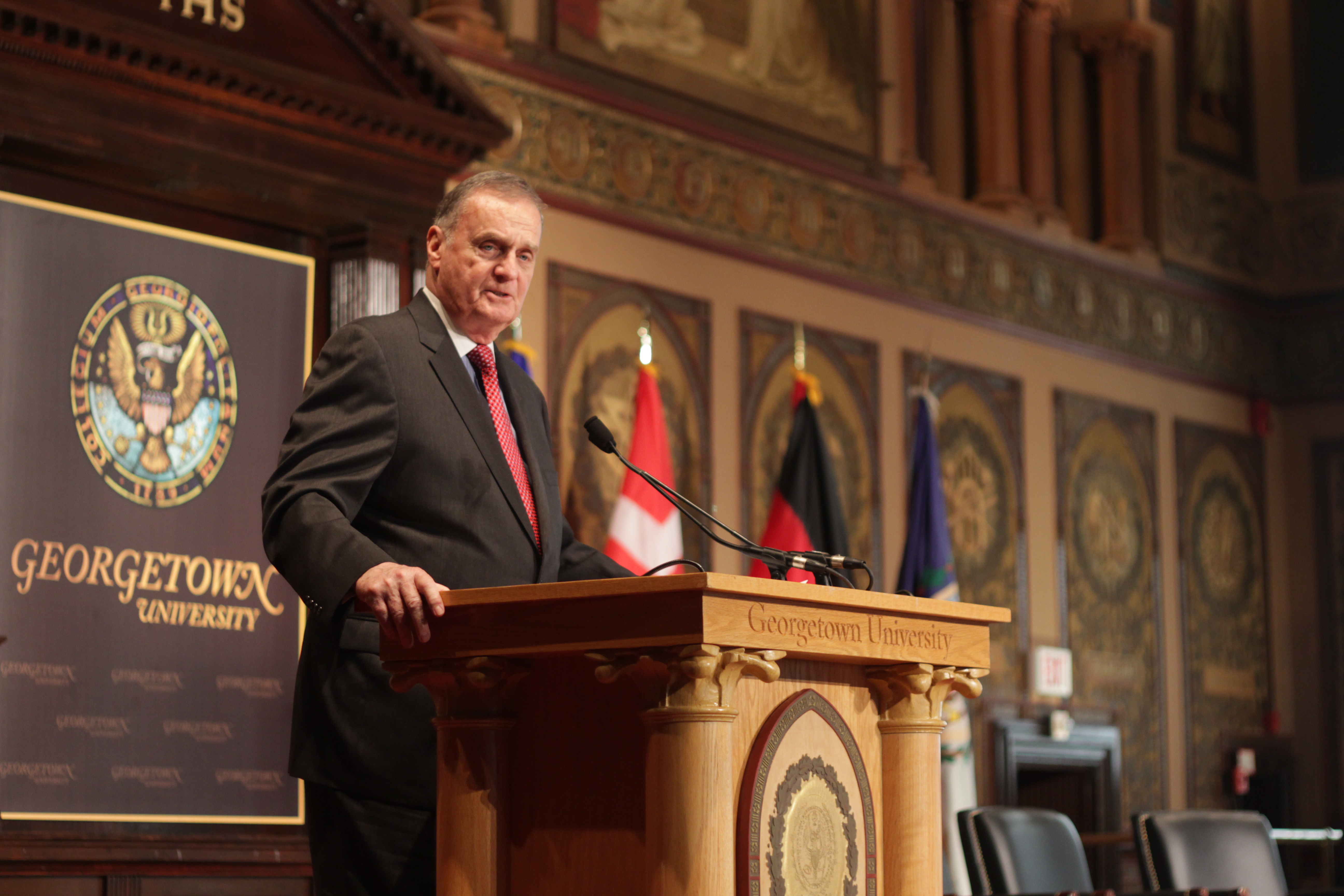
“We meet this afternoon on a topic of monumental consequence to the cause of peace and the cause of stability and prosperity in this very different twenty-first century,” Jones said. “The very concept of what constitutes national security issues and threats is far more complex than in the bi-polar world that dominated the last half of the twentieth century. Protecting U.S. interests—indeed the interests of humankind—in today’s shrinking and highly integrated global community requires a much broader toolkit that the ability to defeat an adversary on the battlefield alone. As important as that continues to be, it is only one leg of the arsenal we need to conduct successful foreign policy and strategy engagement.”
“The security calculus today includes economic security and global development, energy security, cybersecurity, and environmental security,” Jones said. “Insecurity in any of these areas multiplies threats and can cascade into armed conflict disrupting the world order, in which U.S. interests are heavily vested. That’s why modernity demands a much more sophisticated concept of how to approach the very concept of national security.”
“Simply, the danger the changing climate poses to U.S. national security and the national security of our friends and allies is clear and present. It is powerful and it demands action.”
Climate Diplomacy Essential For Island and Developing States
Following Jones’ remarks, a panel featuring German Ambassador Peter Wittig, Danish Ambassador Lars Gert Lose, and Barbadian Ambassador Selwin Hart took the stage. Kathleen Hicks, Senior Vice President at the Center for Strategic and International Studies (CSIS), moderated the discussion.
“In the United States, we typically talk about climate’s intersection with security as an accelerant of trends—water, food, and energy are three of those areas,” Hicks said. “It has been led—perhaps to some ironically—by the Defense Department, which in our culture tends to be looking out the furthest and has a planning culture.”
Ambassador Wittig of Germany reflected on his former post as German Ambassador to the United Nations, where he served as Security Council president in 2011. “I wanted to introduce this topic of climate security—climate change and its repercussions on international peace and security,” Wittig said. “It worked because Africa, a very powerful bloc of fifty-four countries, and SIDS (Small Island Developing States) that are mostly affected by rising sea levels. In the end, we wrote a declaration that I would read in the Security Council saying basically that climate change is a threat to international peace and security. But it is only on paper, of course, and says nothing about the action.”
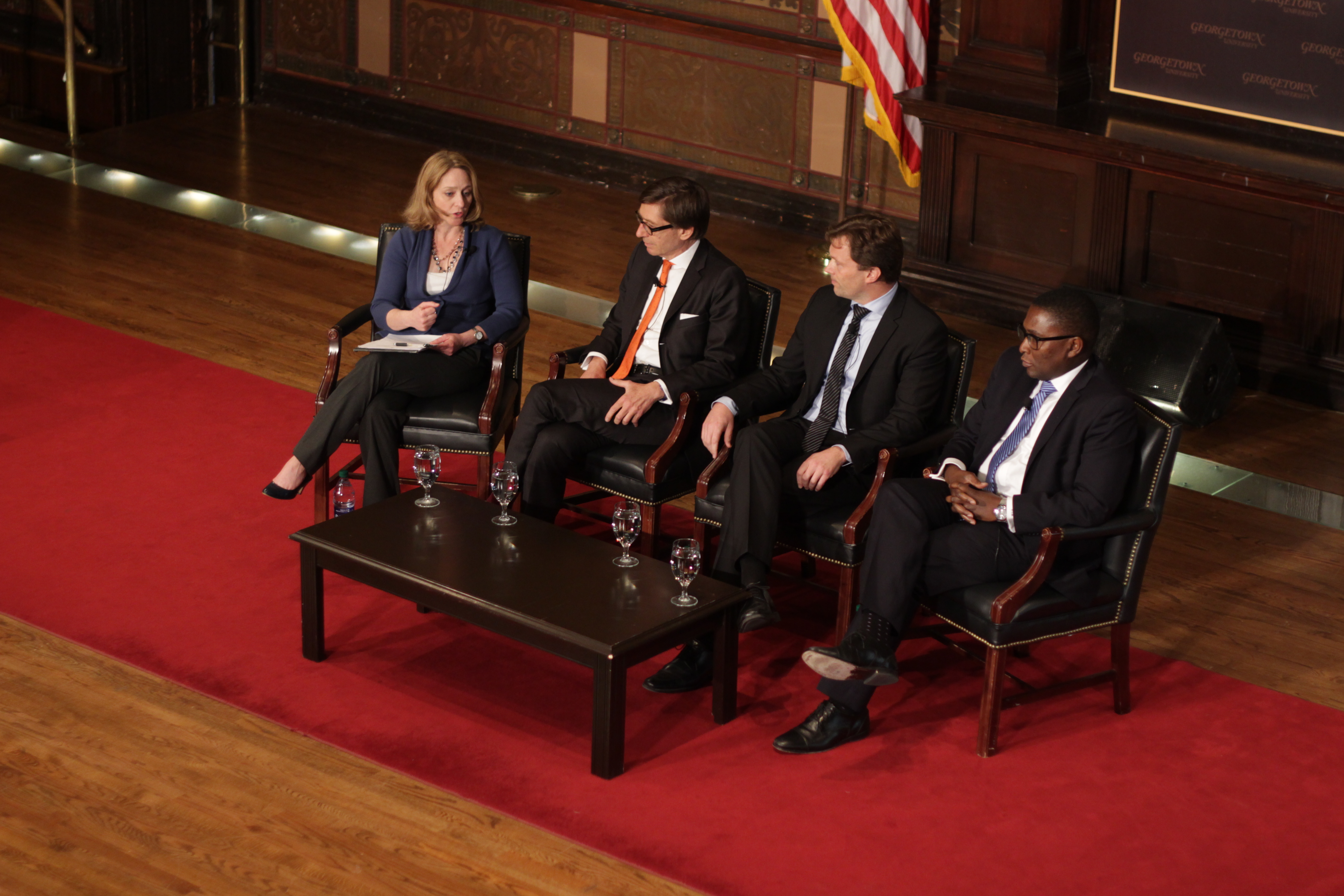
Success of Paris Climate Conference
“Since 2011, we have made real progress. The most spectacular success was the Paris Climate Conference and the agreement,” Wittig said. “It was almost a universal agreement—175 countries subscribed to it—and developing countries are now inspired to develop their own strategies to deal with climate change and adaptation. Secondly, there is a big mobilization of funds in developed countries to finance measures of adaptation and mitigation, a hundred billion a year by 2020. That financing commitment is a powerful tool if it’s used well.”
Wittig added that Germany is the biggest financier of those funds to fight climate change and is also hosting the Bonn Climate Conference in May of this year.
“Climate change is one of the most burning challenges of our world,” Wittig said. “The consensus in Europe and beyond is that this is global, that we are bound to work together, and that it doesn’t stop at our doorsteps and we can’t fence it in.”
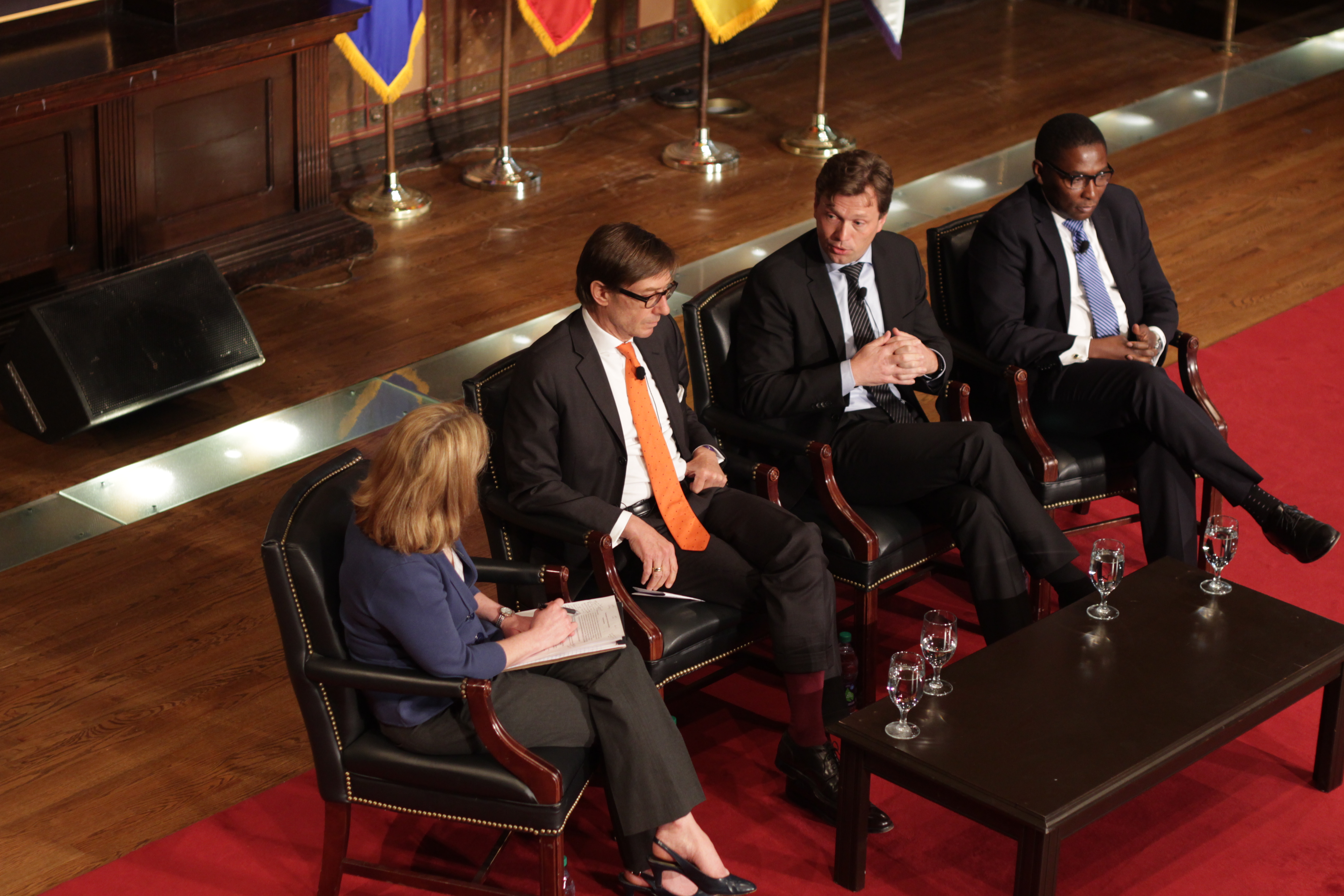
Clean Energy: A National Security Issue
Ambassador Lose of Denmark started by looking back on the history of the diplomatic engagement on the issue. “One of the reasons why we are where we are when we think about climate is because it dates back to the seventies,” Lose said. “In 1973 we had the major oil crisis. It actually spurred security concerns in Denmark because back then 99% of our energy consumption was carbon-based oil and fossil fuels. It led to a major economic recession, we had rising unemployment and car-free Sundays. We started discussing that we needed to change our energy mix—we need to approach this in a different way, basically from a security perspective.”
“We started then what we called the green transition. I think we have been pretty successful,” Lose said. “In 2015, 42% of [Denmark’s] electricity was produced by wind alone. We’ve had an 80% increase in GDP in the last two decades without increasing our energy consumption. Since the 90s, our energy consumption has fallen by 9% and we reduced our carbon emissions by 36%. We’ve come along way and this is really part of our DNA when thinking about climate and security.”
“If you’re ever in doubt about if climate change is real, go to Greenland—go through the Arctic—the changes are massive up there. Temperatures are rising at twice the speed compared to other regions of the world,” Lose said. “The ice cap is melting and this is completely changing the livelihood of the indigenous population there.”
Vulnerable Coastal Areas Face Greatest Threats
Ambassador Hart of Barbados described his own country’s proximity to very real environmental changes. “I represent a country and a region on the front lines of the fight against climate change,” Hart said. “60% of all citizens from the Caribbean live, and 90% of all economic economic takes place, within one mile of the coastline. Therefore, sea-level rise and the increasing frequency of extreme weather events has a devastating impact on the Caribbean.”
“For those who think that climate change is some future event, I am here to say it is happening now and it is getting worse,” Hart said. “Nineteen of the major cities in the Caribbean are extremely vulnerable to sea-level rise.”
Whither American Leadership?
The conversation moved to discussion the new Trump administration and the American departure from international leadership on climate issues. The panel appeared to agree that this absence from the world’s largest economy, if unresolved, would be dangerous.
“What we can hope from this new administration is that it does not leave Paris,” Wittig said. “The jury is still out. It’s no secret that we pleaded with this administration that it’s better to stay in than out. I hope that those members of the administration prevail that are in favor of staying in the Paris agreement.”
“It would be a major setback if the U.S. were to abandon its great leadership on climate issues,” Wittig added.
“A lot can be done in state government,” Lose said. “The green transition in the U.S. takes place in the states—Massachusetts and California. The good thing these days is that green technology has developed to a point where it’s actually competitive and good business. Do you know what the biggest wind-producing state in the U.S. is by far? It’s Texas.”
Ambassador Hart expressed concerns that the U.S. would not implement the Paris agreement. “Developing the rulebook to implement the Paris Agreement is an important aspect of the work that must be done,” Hart said. “The agreement is great, but we want rules around transparency, which will hold all countries accountable to delivering on their commitments.”
